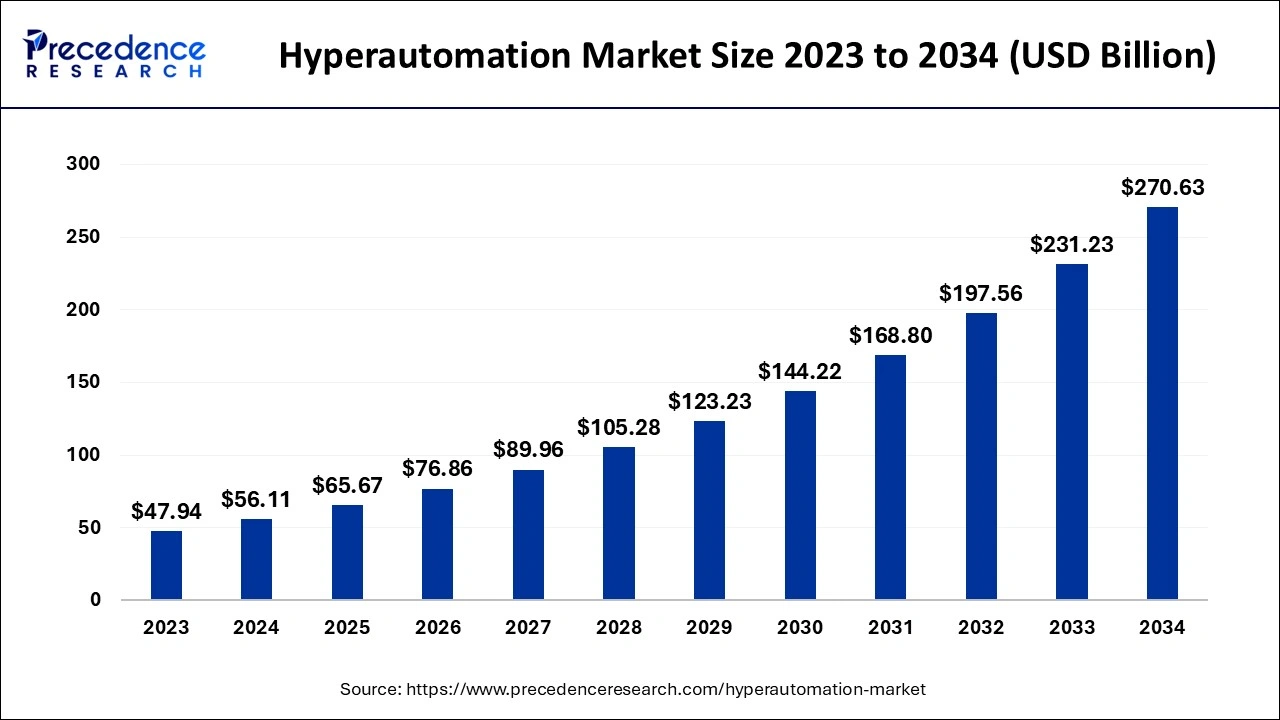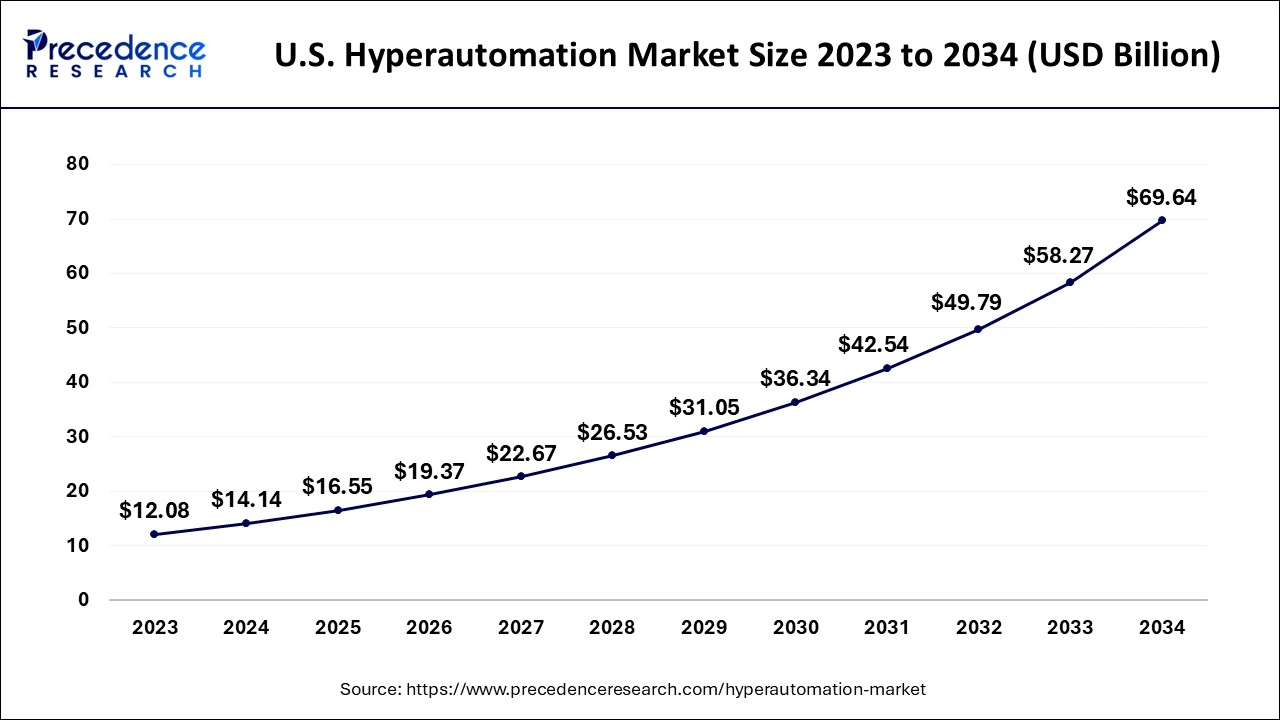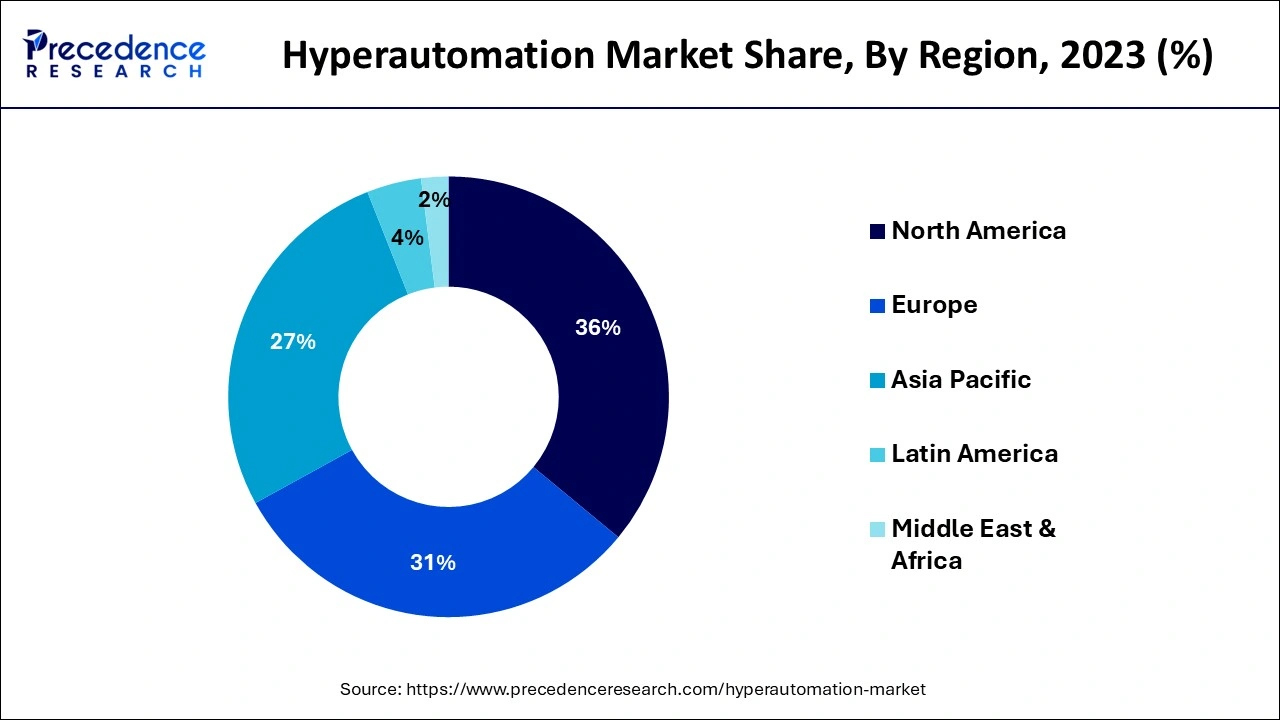What is the Hyperautomation Market Size?
The global hyperautomation market is accounted at USD 65.67 billion in 2025 and predicted to increase from USD 76.86 billion in 2026 to approximately USD 306.21 billion by 2035, representing a CAGR of 16.64% from 2026 to 2035.

Hyperautomation Market Key Takeaways
- North America dominated the market with the largest market share of 36% in 2025.
- Asia Pacific is expected to expand at the fastest CAGR throughout the projected period.
- By component, the hardware segment dominated the market in 2025. While the software segment is estimated to witness the fastest growth rate during the forecast period.
- By deployment, the cloud deployment segment dominated the market and captured more than 52% in 2025.
- By technology, the robotics process automation segment dominated the market with the largest market share in 2025.
- By function, the marketing and sales function segment is projected to grow at the fastest rate during the forecast period.
- By enterprise, the large enterprise segment dominated the market with the highest market share in 2025.
- By end-user, the IT and Telecommunication segment dominated the market in 2025. The retail segment is expected to register significant growth during the forecast period.
What are the Rigorous Applications of AI in Hyperautomation?
Hyperautomation is the process in which there are several automation tools that enable robotics automation processes, machine learning, and artificial intelligence to expand automation initiatives. Hyperautomation is the newest and emerging technological solution that plays several major roles in the development of industries such as collecting data or insights on the process, environment, and workflow.
Hyperautomation is also capable of identifying unstructured and structured data and inputs which are often required to fulfill the operations in management. Hyperautomation transforms organizational tasks by automating tasks and generating solutions while minimizing human intervention. Hyperautomation works on the principles of artificial intelligence, robotics, automation processes, and other technologies that work effectively and brilliantly without any human support.
Hyperautomation Market Growth Factors
Hyperautomation carries multiple advantages in terms of offering efficient workflow of the business. It helps businesses to maintain consistency, speed, and accuracy which results in reduced cost of the process and enhances the consumer experience. There are various hyperautomation tools available as per the requirements of businesses. Hyperautomation works on the center on add on the more intelligences and an advanced system-based approach to expand the automation efforts. This capability of hyperautomation system is expected to boost its adoption in industries while acting as a growth factor for the market.
Hyperautomation reduces the cost of the business operations, it increases the association between IT and business. Hyperautomation increases the adoption rate of machine learning and artificial intelligence in organizations, as industries focus on prioritizing advanced technologies, the adoption of hyperautomation solutions is expected to increase.
Trends & Future Outlook in the Hyperautomation Market
- Escalating Digital Twin Integration: The market companies are widely using digital twins, virtual representations of physical assets or processes, and are advancing beyond manufacturing. In 2025, they will become integral to simulating and strengthening complex systems in real-time within logistics, healthcare, and supply chain management.
- Human- AI Collaborative Models: In the future, the globe will foster robust interaction models between human workers and intelligent systems, emphasising "human-in-the-loop" systems for error, complex decision-making, and ethical considerations.
- Emergence of Industry-Specific Solutions: Researchers will study customized hyperautomation solutions for particular industries, like healthcare, finance, manufacturing, and supply chain, that underline their unique risks and regulatory environments.
Market Scope
| Report Coverage | Details |
| Market Size in 2025 | USD 65.67 Billion |
| Market Size by 2035 | USD 306.21 Billion |
| Growth Rate from 2026 to 2035 | CAGR of 16.64% |
| Largest Market | North America |
| Fastest Growing Market | Asia Pacific |
| Base Year | 2025 |
| Forecast Period | 2026 to 2035 |
| Segments Covered | By Component, By Deployment, By Technology, By Function, By Enterprise, and By End Use |
| Regions Covered | North America, Europe, Asia-Pacific, Latin America, and Middle East & Africa |
Market Dynamics
Driver
Booming e-commerce industry
The most emerging e-commerce industry has a plethora of space for automation. The E-commerce industry has a large emphasis on order processing since more people than ever utilize loyalty programs and shop online.
AI-based hyperautomation solutions are observed to fasten the front-end processes including targeted marketing via social media, advertisement placement and targeted email marketing. Additionally, hyperautomation has been used to track and assess market elements like pricing competition and client feedback, enabling quicker, more accurate decision-making that increases revenue and profitability. Hyperautomation also enables the improvement of accuracy, efficiency, and cost-effectiveness in back-end retail processes like procurement, billing, supplier management, inventory, and transportation. Thus, the element drives the market's growth.
Restraint
Higher acquisition cost
Installing hyperautomation systems in industries can be more expensive than traditional systems. Hyperautomation requires a substantial investment for transforming infrastructure, technology, and human resources. Small and medium organizations cannot apply the hyperautomation systems due the financial or capital constraints, hereby, the installation cost limits industries from adopting such solutions, thus acts as a restraint for the market.
Opportunity
Emerging trend of process mining
Process mining and hyperautomation can work hand-in-hand with process orchestration tools, the insights gained from process mining can feed into the process orchestration system, guiding the overall automation strategy and ensuring that automated processes work seamlessly together. Process mining can be combined with AI and machine learning techniques to uncover hidden patterns and insights that lead to better automation decisions. By leveraging AI, hyperautomation can be even more sophisticated and adaptive, handling complex processes with a higher degree of autonomy. Thus, the emerging trend of process mining is observed to open a plethora of opportunity for the global hyperautomation market.
Component Insights
The hardware segment dominated the market with the largest market share in 2025. The growth of the segment is attributed to the factor that hyperautomation hardware component increases the efficiency of operations, as the hardware works to enhance the effectiveness. Hyperautomation hardware is used by several industries such as healthcare, automobile, banking and finance, supply chain, etc. hyperautomation hardware combines several tools such as artificial intelligence, machine learning, robotic process automation, and other technologies for enhancing the ability to automate work in industries.
Deployment Insights
The cloud segment dominated the market in 2025, the segment will continue its dominance throughout the forecast period. Cloud-based deployment allows businesses to gain a larger amount of data for analyzing and conducting operations. As industries expand and transfer towards hyperautomation there is a need for huge data management tools or programs that can handle the enormous amount of data more accurately and precisely.
Traditional data management models are unable to store that amount of data and there is the requirement for a larger space for storing that data. Moreover, the data stored, and operation associated with the cloud-based systems can be generated and handles from any location, this benefit caused by the cloud deployment promotes the segment's growth.
Technology Insights
The robotics process automation segment is projected to witness the fastest growth in the market during the forecast period. The growth of the segment is attributed to the rising requirements for the massive amount of data storage in big data companies. Robotic process automation often works in the form of a tool that is based on the principles of automation technologies in industries. Robotics process automation utilizes software for performing higher-level business process activities without any human intervention.
It enhances the rate of customer satisfaction due to the 24/7 working chatbot and bots which minimizes the time of waiting of the consumers.
Functions Insights
The sales and marketing segment held the largest share of the market in 2025. The segment will continue to sustain its position throughout the forecast period. Industries across the globe have started depending on the automation on generative processes for providing better leads to the sales team, and campaign accuracy. These factors contribute to the growth of the segment. Automation tools are the most valuable software in the growth of the sales and marketing industry.
The information which is gained by the sales and marketing automation tools can enhance the productivity of the industries by reducing the time taken for the operation. Sales and marketing automation is being widely utilized for website tracking and analytics, it analyzes and detects future potential customers on the website and gives valuable insights into their interests, needs, and inclination. The hyperautomation models are used in campaign tracking and construction; the tool is useful to detect the location of engagement.
Enterprise Insights
The large enterprises segment dominated the market in 2025, the segment will continue to grow at a significant rate during the forecast period. Large-scale industries often carry a huge amount of data, unstructured and structured. The growth of the segment is attributed to the requirement for data analytics in large-scale industries. Large enterprises are shifting towards the digitization process to boost the productivity of the organization and manage operations. Hyperautomation improves management and governance processes, it minimizes the operation hurdle and costs. Hyperautomation helps to identify and eliminate the low-value workflow in the large enterprise. It increases the enterprise's process documentation and standardization. Enterprise hyperautomation is the advanced steps toward the growth of the company's automation, predictive intelligence capabilities, and analytics. This also allows the businesses to shift from menial work to high-value tasks. Thus, it promotes the growth of the segment.
End-User Insights
The IT and Telecommunication segment dominated the market in 2025. Hyperautomation simplifies the operational task in the IT and telecommunication sector. Hyperautomation is the most emerging technology in the IT and telecommunication sectors, that is revolutionizing the sector by enhancing cost-saving and improving efficiency. The IT and telecommunication industry actively participates in the adoption of advanced technologies as it has been observed to be one of the most competitive industries across the globe.
Hyperautomation provides insights for the IT and telecom firms to enhance operations and consumer satisfaction. Hyperautomation automates customer service tasks like answering queries and providing technical support. It automates network management tasks, like monitoring and provisioning. As the industry focuses on the adoption of generative and smart solutions to manage repetitive operations, the segment's growth is expected to be fueled.
On the other hand, the retail segment is expected to witness a significant growth rate during the forecast period. With the emergence of e-commerce platforms, the retail industry is focusing on minimizing human errors. Improving business safety, optimizing sales, reducing operational costs and customer satisfaction. All these requirements are excellently fulfilled by hyperautomation solutions. Moreover, the retail industry is expected to utilize the hyperautomation solutions and systems to boost sales. Order confirmation, processing sales history, improved visibility and customer engagement can be achieved by such solutions. All these factors considered in the industry are expected to fuel the segment's growth.
Regional Insights
U.S. Hyperautomation Market Size and Growth 2026 to 2035
The U.S. hyperautomation market size is accounted for USD 16.55 billion in 2025 and is projected to be worth around USD 81.01 billion by 2035, poised to grow at a CAGR of 17.21% from 2026 to 2035.

What Made North America Dominant in the Market in 2025?
North America dominated the market with the largest market size in 2025. The region is estimated to sustain its position throughout the forecast period due to the substantial potential of the region in the field of robotics. The growth of the market in the region is attributed to the rising industrial development in the region. The large-scale as well as small and medium scale industries including start-ups show willingness towards adopting automation solutions to boost the efficiency and productivity of their firm. Moreover, the presence of the IT and Telecommunication industries which generally work on the automation models in the region drives the growth of the hyperautomation market in North America.
U.S. Hyperautomation Market Trends
The U.S. registered dominance in the hyperautomation market with raised steps in financial services, such as Auditoria.AI, a U.S.-based startup, which employs AI-driven SmartBots for automating redundant accounts receivable and accounting processes, enhancing speed and visibility into cash positions. Whereas, the US hospitals are executing hyperautomation for tasks, including automated patient record-keeping, appointment scheduling, and AI-enabled diagnostic support tools.
According to the report published by Association of Automation, North American companies have ordered 9,186 units of robots in the first quarter of 2023. The total cost of this order is valued at $597 million. Considering the rising rate of automation through the implementation of robots in industries, the region is expected to witness a massive growth in the market in the upcoming years.

Rising Shift Towards Digitization is Fueling the Asia Pacific
Asia Pacific is expected to witness the fastest rate of growth during the forecast period. The rising urbanization and industrialization in the region act as a major growth factor for the market. In Asia Pacific, multiple major companies and industries are actively participating in the shift towards digitization to sustain in the market, the element is expected to fuel the market's growth in the region. Improving economies in countries of Asia Pacific also results in higher adoption of the hyperautomation systems and technologies in the organizations for better workflow and reduced operational costs.
Innovative Robotics Plans: China Market Trend
The market in Asia Pacific is expected to be fueled with the rising emphasis on the innovation and development of robotics in the region. China especially, is estimated to have a significant development in the field of robotics. China's Ministry of Industry and Information Technology has introduced ‘Robot + Application Action Plan' which focuses on the development and improving the robotics sector by 2025. This element will improve the market's position in the region in the upcoming years.
Implementation of Hyperautomation in Different Areas is Supporting Europe
In Europe, the market is growing with a notable CAGR, as France is allocating hospital workflow bots to relieve administrative burdens and manage patient data, making available medical staff for patient care. Moreover, the UK is using this solution in customs clearance, as a lever for robust post-Brexit trade facilitation.
Germany Hyperautomation Market Trends
Many German firms are implementing AI, RPA, and IoT to handle inventory, monitor shipments, and improve delivery routes, which makes supply chains more resilient. However, Smartlane GmbH offers an AI-powered SaaS solution for an autonomous transport strategy, supporting logistics providers in reducing operational costs by up to 20%.
Top Companies in the Hyperautomation Market & Their Offerings:
- Wipro Ltd.- Specifically, they facilitate through their proprietary Wipro HOLMES AI Platform.
Tata Consultancy Services Ltd.- This focuses on the Machine First Delivery Model (MFDM), which uses a blend of artificial intelligence (AI), robotic process automation (RPA), and other developing technologies. - Mitsubishi Electric Corporation- It is a pioneer in manufacturing and industrial applications by using robotics, IoT, AI, and machine learning.
- UiPath- A firm that usually offers solutions through its comprehensive Business Automation Platform.
- OneGlobe LLC- This provides a variety of hyperautomation solutions evolved to simplify complex business processes and modernize legacy operations.
Hyperautomation Market Companies
- Wipro Ltd.
- Tata Consultancy Services Ltd.
- Mitsubishi Electric Corporation
- UiPath
- OneGlobe LLC
- SolveXia
- Appian
- Automation Anywhere Inc.
- Allerin Tech Pvt. Ltd.
- PagerDuty, Inc.
- Honeywell International Inc.
Recent Developments
- In July 2023, “Cashflo” a supply chain platform and integrated accounts payable launched the payment and accounts payable automation and payments purchases the artificial intelligence to automate the operational tasks in the organizations.
- In July 2023, “Symbotic LLC”, a warehouse robotics provider announced that the company has entered into a strategic partnership with the Softbank Group Corp, a Japanese investment firm to make a funded joint venture company using Symbotic's technology to offer warehouse-as-a-service automation products.
- In July 2023, a leader in document workflow automation solutions “airSlate” announced the launch of Document Automation Hub for the developers to automate, access, and manage every document process API, form document generation and PDF editing to the collection of data, and immerse signature and forms, form the single location.
Segments Covered in the Report
By Component
- Hardware
- Software
- Services
By Deployment
- On-premise
- Cloud
By Technology
- Robotic Process Automation (RPA)
- Machine Learning (ML)
- Biometrics
- Chatbots
- Context-Aware Computing
- Natural Language Generation (NLG)
- Computer Vision
By Function
- Marketing & Sales
- Finance & Accounting
- Human Resources (HR)
- Operations & Supply Chain
- Information Technology (IT)
By Enterprise
- Large-size Enterprises
- Small & Medium-size Enterprises (SMEs)
By End Use
- Manufacturing
- Automotive
- BFSI
- Healthcare
- IT & Telecommunication
- Retail
- Transportation & Logistics
- Others
By Geography
- North America
- Europe
- Asia-Pacific
- Latin America
- Middle East and Africa
For inquiries regarding discounts, bulk purchases, or customization requests, please contact us at sales@precedenceresearch.com
Frequently Asked Questions
Ask For Sample
No cookie-cutter, only authentic analysis – take the 1st step to become a Precedence Research client
 Get a Sample
Get a Sample
 Table Of Content
Table Of Content
 sales@precedenceresearch.com
sales@precedenceresearch.com
 +1 804-441-9344
+1 804-441-9344
 Schedule a Meeting
Schedule a Meeting